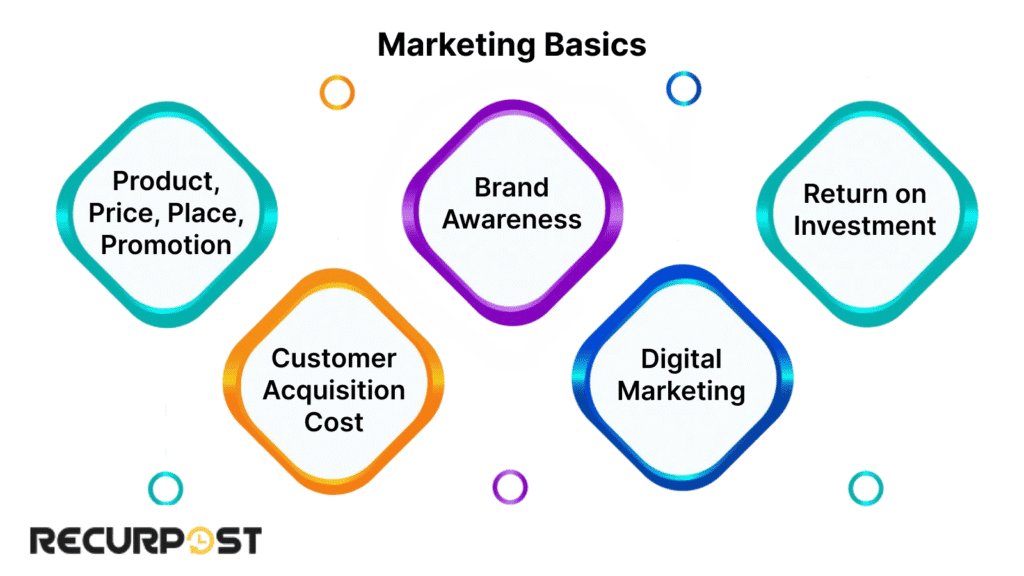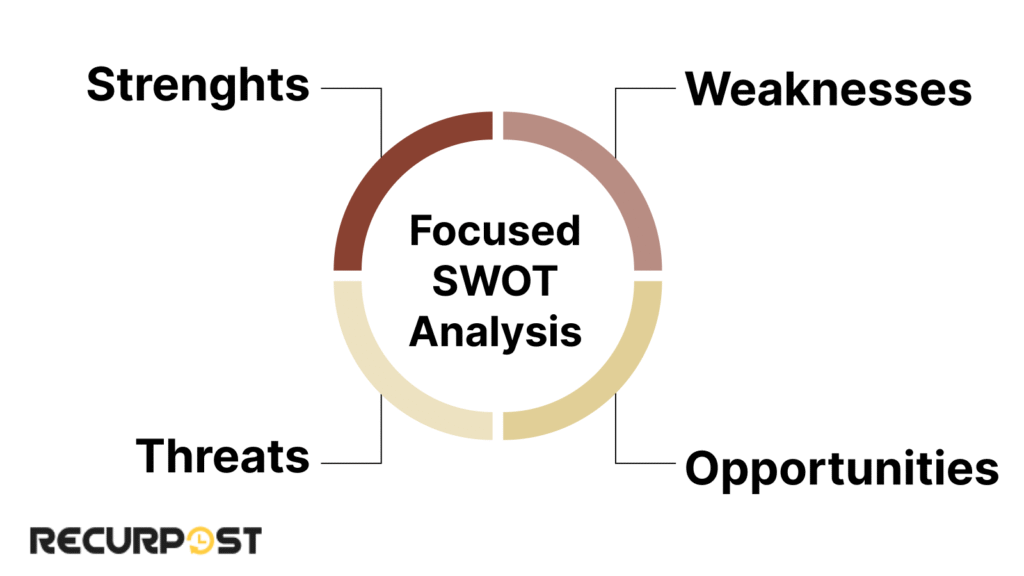Your Roadmap to Measurable Growth
Many small business owners need a clear marketing strategy to attract customers and increase brand awareness. A marketing plan is a strategic document that ties into the overall business plan and mission statement. This marketing plan for small businesses guide shows how to turn business goals into marketing initiatives that drive measurable results.
Unlike blueprints created by marketing experts with unlimited resources, this marketing plan works on any budget. It covers setting objectives, defining target customers, and choosing effective marketing channels. Following these steps eliminates guesswork and creates a successful marketing plan.
This guide explains how to measure key metrics, adjust tactics, and refine your approach over time. Each section builds on previous ones to form an actionable roadmap. This plan helps your company stand out in a crowded market and consistently win new customers.
Marketing Basics Every Small Business Owner Should Know

Before creating a marketing plan, small business owners must understand core marketing concepts. Marketing is about promoting products or services to attract and retain customers, focusing on building relationships and brand awareness instead of just closing sales.
The marketing mix includes four key areas: Product (what you sell), Price (what you charge), Place (where you sell), and Promotion (how you communicate with customers). Small businesses thrive by balancing these areas to meet customer needs and stay profitable.
Customer acquisition cost is the amount it takes to gain a new customer, while customer lifetime value measures the total revenue a customer brings over time. When lifetime value exceeds acquisition cost, the business grows sustainably.
Brand awareness is how easily potential customers recognize your business. Word-of-mouth marketing occurs when satisfied customers recommend your business to others. Both methods cost less than paid advertising and often convert better.
Digital marketing uses online channels like websites, social media, and email to reach customers, while traditional marketing relies on offline methods such as print ads, radio, or direct mail. Most small businesses blend both strategies based on where their target audience spends time.
Return on investment (ROI) tracks how much revenue each marketing dollar generates. A positive ROI means marketing activities bring in more revenue than they cost. Track ROI for each marketing channel to understand which ones are the most effective.
Step 1: Define Business Goals and Marketing Objectives

Begin by listing clear business goals and marketing objectives. Set revenue targets and profit margins to guide marketing activities. Small business marketing plans work best with 3–5 specific marketing goals.
Align marketing objectives with overall business goals. For example, aim to increase sales by 20% in 12 months or gain 500 new customers. This alignment keeps the marketing plan focused on the target market’s needs.
Use the SMART framework, and each objective must be measurable and time-bound. Tracking key metrics like lead volume and conversion rate shows progress. These goals form the foundation of your small business marketing plan.
Step 2: Conduct Lean Market Research

Market research identifies your target audience and what drives their purchasing decisions. Use surveys, interviews, and focus groups to collect direct feedback from potential customers.
Perform competitive analysis on 3–5 rivals. Study their marketing channels, pricing strategy, and messaging.
Scan industry trends with tools like Google Trends and free reports. Allocate about 10–15% of the marketing budget to market research activities.
Tip: Reserve 20% of your research budget for one-on-one customer interviews. They uncover insights no report can match.
Step 3: Build Detailed Customer Personas

Create 2–4 customer personas representing your target audience. Each persona includes demographics, pain points, goals, and preferred marketing channels. These profiles guide marketing messages and focus marketing efforts effectively.
Give each persona a name, a brief backstory, and a “day in the life” scenario. List the main challenges personas face and how your business solves them. These detailed profiles enable tailored content marketing, social media marketing, and email marketing.
Struggling with improving your social presence? Here’s how to tackle the most common social media marketing challenges and issues head-on.
Tip: Use survey data and interviews from Step 2 to fill in real quotes. This adds authenticity and highlights competitive advantage.
Step 4: Perform a Focused SWOT Analysis

A SWOT analysis maps Strengths, Weaknesses, Opportunities, and Threats. List internal resources and areas needing improvement. Identify external factors, including market trends and competitive threats.
Strengths might include a unique value proposition or strong customer service. Weaknesses could be a limited budget or a small marketing team. Opportunities cover untapped channels or niche market segments.
Threats range from new rivals to changing regulations. Rank each item by impact and effort using an effort-impact matrix. This clear view of competitive advantage keeps the marketing plan on track.
Step 5: Craft a Clear Value Proposition

A value proposition states why customers choose your business over competitors. It highlights the main benefits, such as lower cost or faster service. This element drives all marketing messages and campaigns.
Use this formula:
- Problem solved by the product or service
- Benefit delivered (quantifiable when possible)
- Unique feature that sets it apart
For example, “Get custom coaching plans in 48 hours,” not just “We offer coaching.” A strong value proposition boosts marketing success and supports competitive advantage.
Tip: Test the draft with five potential customers. If they repeat it back, it’s ready for the marketing plan.
Step 6: Select 3–5 High-Impact Marketing Channels

Match each customer persona to their preferred marketing channels. Options include social media marketing, email marketing, content marketing, and online advertising. Direct mail and local events serve as additional distribution channels.
Focus on channels where your target audience spends most time. Use LinkedIn for coaches and Facebook ads for local retailers. This targeted approach maximizes marketing efforts and ROI.
Allocate time and budget to each channel based on expected impact. Track channel performance with key metrics like click-through rate and cost per lead. Adjust the channel mix quarterly to keep the small business marketing strategy fresh.
Step 7: Allocate Marketing Budget & Internal Resources

Determine your marketing budget as a percentage of revenue. New businesses typically allocate 20–30% of projected revenue, growth-stage firms 12–20%, and established small businesses 7–12%. Include financial projections to align spending with revenue targets and profit margins.
Break the budget into key areas:
- Digital ads: 30%
- Content creation: 20%
- Email and social media marketing: 15%
- Tools and software: 15%
- Analytics and reporting: 10%
- Contingency fund: 10%
Use available internal resources, team time, existing content, and free tools before adding new expenses. Adjust these numbers as actual costs and key metrics come in to keep the small business marketing plan on track.
Tip: Set aside at least 10% of the marketing budget for testing new marketing tactics and channels.
Step 8: Develop a Detailed Content & Campaign Calendar

Organize all marketing activities in a calendar or marketing plan template. Schedule blog posts, social media posts, email marketing campaigns, and online advertising. Assign task owners and required marketing materials, including images and downloadable guides.
Plan marketing campaigns around key dates, product launches, seasonal events, or promotional offers. Use a simple spreadsheet or free template to track deadlines, distribution channels, and expected outcomes. This clear schedule keeps the marketing team on the same page and ensures consistent marketing efforts.
Step 9: Implement Tracking & Analytics

Set up measurement tools for each marketing channel. Google Analytics tracks website traffic and conversion rates. UTM parameters in email marketing and social media links attribute traffic sources accurately.
Track customer acquisition cost, return on ad spend, and customer lifetime value. Integrate CRM data to monitor lead quality and sales goals. Review these figures weekly to see if marketing objectives are being met.
Create a simple dashboard or report template. Compare actual spending against the marketing budget and revenue targets. This data-driven view guides marketing tactics and boosts marketing success.
Step 10: Launch, Monitor, & Optimize

Launch marketing campaigns according to your content calendar. Prepare all marketing materials beforehand email templates, social media posts, advertising creatives, and direct mail pieces.
Monitor the performance of each marketing channel daily during launch week. Key metrics include click-through rate, conversion rate, and cost per lead. Compare results against marketing objectives and revenue targets.
Hold weekly check-ins with the marketing team to review data. Adjust marketing tactics, pause underperforming ads, boost budgets on high-ROI channels, or tweak marketing messages. This ongoing cycle of review and refinement keeps the small business marketing strategy on track.
Tip: Use A/B tests for headlines and calls to action. Small changes often drive big improvements in marketing success.
Bonus: Templates, Checklists & Tools
Grab a free template to jump-start the guide to create a marketing plan for a small business. It includes an executive summary, marketing objectives, and a marketing mix overview. This marketing plan template saves time and sets a clear structure.
Use a persona worksheet and SWOT matrix checklist to fill in customer profiles and competitive analysis. A simple content calendar sheet tracks blog posts, social media posts, and email marketing. These marketing materials keep the marketing team on the same page.
Try tools like RecurPost for social media scheduling, Google Analytics for search engine optimization insights, and Trello for task management. A cost tracker helps manage the marketing budget and financial projections. These resources support continued success and boost marketing success.
Conclusion & Call to Action
This small business marketing plan guide presents each step clearly and actionably. From defining objectives and conducting research to launching campaigns and tracking metrics, every phase builds on previous ones. A solid marketing plan transforms sales growth and market share goals into a structured path forward.
Consistency and review are vital. Stick to the content calendar, monitor performance with tools like Google Analytics, and adjust channels or budget as needed. Quarterly check-ins and small tests keep the plan aligned with customer needs and financial projections.
Put this small business marketing plan into action now. Download the free template, define your business goals, and map your first 90-day campaign. A clear roadmap and proper tools make attracting customers and hitting revenue targets achievable.
Frequently Asked Questions
1. How do I choose the right pricing strategy?
Look at costs, competitor rates, and customer willingness to pay. Test small price changes and track profit margins.
2. What low-cost marketing tactics work for small businesses?
Use email marketing, organic social media posts, and referral programs. Leverage free tools like Google My Business.
3. How do I write an executive summary for my plan?
Summarize business goals, target market, key marketing tactics, budget, and expected ROI on one page.
4. Can I mix offline and online marketing?
Yes. Pair local events, flyers, or direct mail with social ads and email blasts to reach more potential customers.
5. How long before my marketing plan shows results?
You may see web-traffic gains in 1–2 months and sales lift in 3–6 months, depending on your budget and tactics.
6. Is this plan valid for a solo entrepreneur?
Absolutely. Scale steps to fit one person, focus on your strongest channels, and use free or low-cost tools.
7. How often should I update my marketing materials?
Review messaging and creativity every quarter or whenever customer feedback or market trends shift.

As a passionate content writer, I love blending creativity with research to craft compelling narratives that inform, engage, and inspire. With a strong focus on user engagement and brand communication, I create content that resonates with the audience and drives meaningful interactions.
